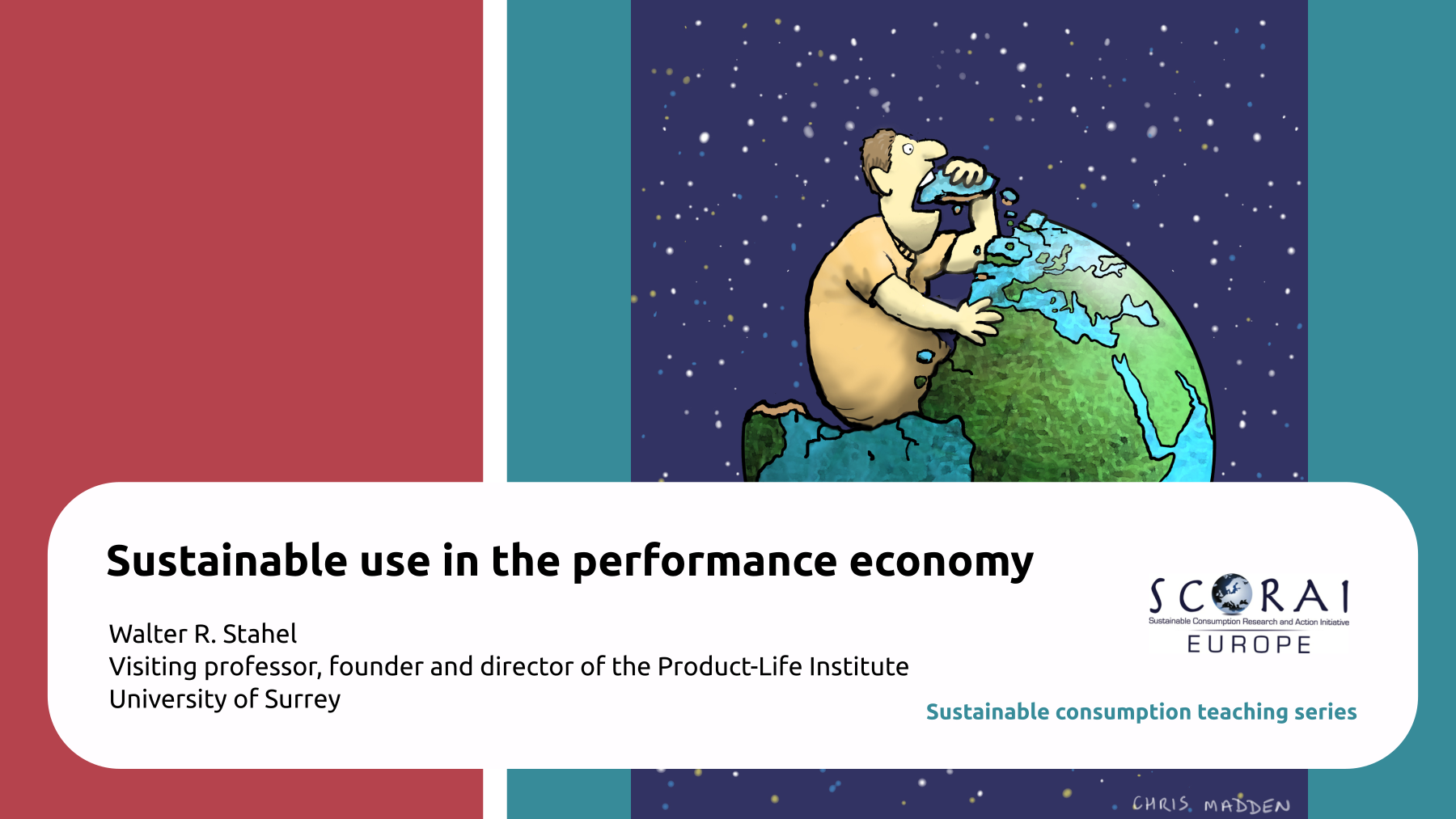By Walter R. Stahel, University of Surrey
Questions to guide discussions
- How would a policy of taxing the consumption of non-renewable resources instead of labor change the economy?
- How could this change incentivise companies to shift from managing production flows to stocks of manufactured objects?
- Why do manufacturers improve ‘the environment’ when retaining the ownership of their goods?
- How does this raise questions related to the internalization of liability for risks and waste?
- What are the business benefits for economic actors in selling performance?
- How could they benefit from sufficiency and systems solutions, in addition to efficiency gains?
- Who detains the knowledge of the performance economy today?
- What is the role of managers of fleets of such objects, such as vehicles, shipping containers, real estate, etc?
Biography
Walter R. Stahel is one of the first scholars to have developed the concept of the circular economy—the vision of a closed loop economy—that would alter how societies organize economic activity, from the world of work to waste prevention. Co-author of the 1976 research report for the European Commission, The Potential for Substituting Manpower for Energy (with Genevieve Reday), he is credited with coining the expression “cradle to cradle” in the late 1970s. Stahel is an alumni of the Swiss Federal Institute of Technology (1971), and founder-director of The Product-Life Institute Geneva, since 1983. Among his publications: The Performance Economy (2006/10) and The Limits to Certainty, Facing Risks in the New Service Economy (1989/92, with Orio Giarini).
Recommended readings
- Giarini, Orio and Stahel, Walter R. (1993) The Limits to Certainty, facing risks in the new service economy, second edition, Dordrecht, Kluwer Academic publishers
- Pirsig, Robert (1973) Zen and the art of motorcycle maintenance.
- Schumacher, Fritz (1973) Small is beautiful, London, Blond & Briggs
- Stahel, Walter R. and Reday-Mulvey (1976) The Potential for Substituting Manpower for Energy, a report to the Commission of the European Communities, Brussels; and (1981) Jobs for tomorrow, The Potential for Substituting Manpower for Energy, New York, N.Y., Vantage Press.
- Stahel, Walter R. (2013) Policy for material efficiency—sustainable taxation as a departure from the throwaway society; in: Philosophical Transactions A of the Royal Society, London. Published 28 January 2013 doi: 10.1098/rsta.2011.0567 Phil. Trans. R. Soc. A 13 March 2013 vol. 371 no. 1986 20110567.
- Stahel, Walter R. (2010) The Performance Economy, second edition, Houndmills, Palgrave-Macmillan.
- Stahel, Walter R. (2001) From ‘Design for Environment’ to ‘Designing Sustainable Solutions’; in: Tolba, M.K. (ed.) (2001) Our Fragile World: Challenges and opportunities for sustainable development. Cambridge UK, UNESCO and EOLSS (editors) (Encyclopedia of Life Support Systems.), pp. 1553-68.
Additional resources
- Perutz, Peter und Stahel, Walter R. (1977) Arbeitslosigkeit – Beschäftigung – Beruf, 1. Preis des GZ Wettbewerb. http://product-life.org/de/archiv/arbeitslosigkeit%E2%80%93beschaftigung%E2%80%93beruf
- Stahel, Walter R. (2016) Characteristics of the three economies: the linear, the circular and the performance economy, http://product-life.org/en/3ecos
- Stahel, Walter R. (2000) from manufacturing industry to a service economy, from selling products to selling the performance of products. http://product-life.org/en/books/from-manufacturing-to-services-a-strategic-report/executive-summary
- Stahel, Walter R. 1986) Hidden innovation – the functional economy: cultural and organisational change.
- Stahel, Walter R. (1982) the Product-Life Factor http://product-life.org/en/major-publications/the-product-life-factor
- Stahel, Walter R. (1982) the Product-Life Factor; Mitchell Prize winning paper. http://product-life.org/en/major-publications/the-product-life-factor
- Wijkman, Anders and Skanberg, Kristian (2016) The circular economy and benefits for Society; retrieved from: https://www.clubofrome.org/wp-content/uploads/2016/03/The-Circular-Economy-and-Benefits-for-Society.pdf

